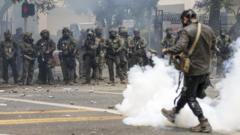As protests against recent ICE immigration raids escalate in Los Angeles, President Trump has ordered 2,000 National Guardsmen to the city, adding to the tensions between federal authorities and local leadership.
National Guard Deployed in Los Angeles Amidst Immigration Raid Protests

National Guard Deployed in Los Angeles Amidst Immigration Raid Protests
Tensions rise in Los Angeles as President Trump responds to unrest surrounding ICE operations with a National Guard deployment.
In Los Angeles, unrest has intensified over recent immigration raids by Immigration and Customs Enforcement (ICE) targeting undocumented migrants. President Donald Trump announced the deployment of 2,000 National Guardsmen to maintain order amid ongoing protests from residents in predominantly Latino communities. Trump's border czar, Tom Homan, stated that the deployment aims to enhance safety in the city, where numerous clashes involving federal agents and protesters have occurred, resulting in multiple arrests.
Tear gas and batons were reportedly used to quell the crowds during demonstrations in the Paramount district. With 118 arrests made this week, including 44 from Friday's actions, California Governor Gavin Newsom condemned the federal operations as “cruel” and at odds with community values. The situation escalated, with the White House claiming that violent protests had endangered federal agents enforcing essential deportation operations, prompting Trump to issue a Presidential Memorandum.
The announcement of the National Guard's involvement faced criticism from California's leadership, with Governor Newsom describing it as an inflammatory move that could further incite tensions. He emphasized that local authorities possess adequate resources for law enforcement and accused the federal government of lacking responsibility. Newsom's frustrations were echoed by Los Angeles Mayor Karen Bass, who criticized ICE's practices by claiming they instill fear in her city.
On the federal side, Homan assured that law enforcement would adopt a "zero tolerance" stance towards any acts of violence during operations. The FBI has warned protesters that interferences with operations would lead to arrests. Community leaders and immigrant rights advocates voiced concerns about the ongoing raids and called for cessation of actions that are affecting families and communities.
As Trump targets California's leadership for allegedly failing to manage the crisis, the deployment of the National Guard underscores the growing divide between state and federal responses to immigration enforcement, revealing the complexities of balancing law enforcement with community concerns.
Tear gas and batons were reportedly used to quell the crowds during demonstrations in the Paramount district. With 118 arrests made this week, including 44 from Friday's actions, California Governor Gavin Newsom condemned the federal operations as “cruel” and at odds with community values. The situation escalated, with the White House claiming that violent protests had endangered federal agents enforcing essential deportation operations, prompting Trump to issue a Presidential Memorandum.
The announcement of the National Guard's involvement faced criticism from California's leadership, with Governor Newsom describing it as an inflammatory move that could further incite tensions. He emphasized that local authorities possess adequate resources for law enforcement and accused the federal government of lacking responsibility. Newsom's frustrations were echoed by Los Angeles Mayor Karen Bass, who criticized ICE's practices by claiming they instill fear in her city.
On the federal side, Homan assured that law enforcement would adopt a "zero tolerance" stance towards any acts of violence during operations. The FBI has warned protesters that interferences with operations would lead to arrests. Community leaders and immigrant rights advocates voiced concerns about the ongoing raids and called for cessation of actions that are affecting families and communities.
As Trump targets California's leadership for allegedly failing to manage the crisis, the deployment of the National Guard underscores the growing divide between state and federal responses to immigration enforcement, revealing the complexities of balancing law enforcement with community concerns.





















